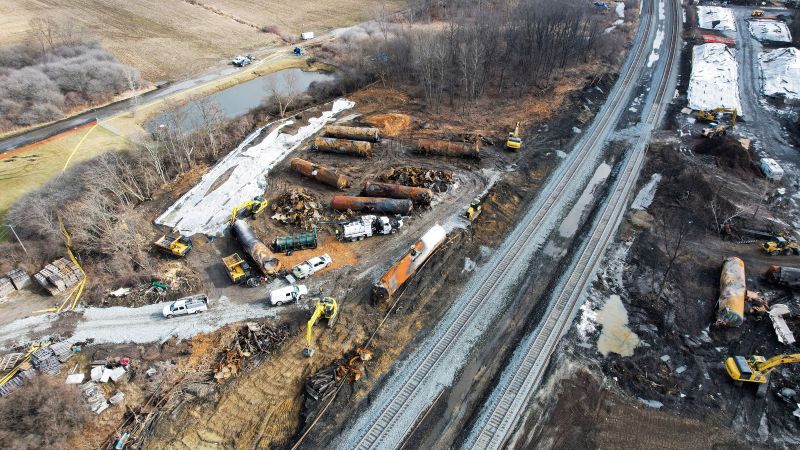Just more than a year after a massive derailment of a Norfolk Southern freight train led to the release of tank cars full of toxic chemicals and increased attention to the issue of railroad safety, the control of the railroad is up for grabs at its annual meeting Thursday.
The fight for control of the Atlanta-based railroad, one of America’s four major freight railroads, could determine more than just who runs the railroad in the future, but also whether it continues using longer and longer trains, a practice criticized by some rail safety advocates. A defeat of current Norfolk Southern management, credited with improving safety practices at the railroad since the February 3, 2023 derailment in East Palestine, Ohio, could make management at other railroads reluctant to take steps to improve safety if it means reduced profit margins.
The fight has split the railroad’s unions, who disagree which management team – the current Norfolk Southern leadership or one proposed by activist investor Ancora Holdings – would be best for safety and the railroad’s employees.
Ancora, which seeks to have its own slate of directors elected and a new CEO and COO put in charge of the railroad, insist current management has proven incapable of running a safe and profitable railroad. It wants to improve profitability at the railroad by greater emphasis on the operating philosphy known as Precision Scheduled Railroading, or PSR, which leads to longer trains making fewer stops at customers’ locations to pick-up or drop-off rail cars.
PSR is generally opposed by both rail unions and many rail customers, and Norfolk management appeared to be taking steps away from PSR in the wake of the East Palestine derailment.
Norfolk Southern CEO Alan Shaw and his management team received praised by some who, in the past, criticized the railroad’s performance, including Amit Bose, administrator of the Federal Railroad Administration, the nation’s rail regulator.
In a letter to Norfolk Southern in February soon after the takeover effort started, Bose praise the railroad instituting a “confidential close call reporting system” similar to one in place for decades at the nation’s railroads to allow employees to report safety issues without fear of reprisal, as well as increasing staffing and training. He said Shaw’s safety efforts “are important and demonstrate the ability to make progress when railroads make safety a priority.” And he said that NS was the only Class I railroad to achieve significant reductions in the rate of mainline derailments last year.
His letter suggested his concerns that that progress could be lost due to the takeover battle.
“While I recognize NS for the meaningful steps and results seen so far, often in notable contrast to industry peers, I want to emphasize the importance of a durable and lasting path forward that continues to prioritize safety,” he wrote. “Any backsliding, as a result of a change in leadership or otherwise, on the safety-oriented path you have laid out and communicated to us will likely attract renewed oversight attention from my office.”
After initially being united in opposition to the takeover effort, the railroad’s unions are now split on the takeover battle.
Most of the unions remain supportive of current CEO Alan Shaw and Norfolk Southern’s current board.
“NS and Shaw have placed a unique focus on establishing a culture that addresses safety concerns that other carriers have not,” said a letter from Jeremy Ferguson, president of SMART-TD, the union that represents more than 5,000 conductors at the railroad.
The Brotherhood of Locomotive Engineers and Trainmen (BLET), which represents more than 3,000 engineers at the railroad, joined the other unions at the railroad in initially endorsing Norfolk management, saying that Ancora’s plans for Norfolk would be “reckless” and “likely to lead to more train wrecks.” It said Ancora’s PSR plan “requires railroads to do more with less which equates to longer trains, deferred maintenance of track and equipment, shorter inspections of rolling stock and a reduction in staffing numbers.”
And it praised the changes that Shaw had made to improve safety since the February 2023 derailment in East Palestine, Ohio.
“Shaw was only on the job for a few months prior to the disaster. Since the derailment last year, NS’ CEO has risen to the occasion and, through his leadership, NS has become a safer, more efficient and customer focused company again,” said Jerry Sturdivant, a BLET union official at Norfolk Southern, back in February.
But the BLET said the changes that Norfolk Southern has made to try to answer Ancora’s takeover efforts are taking the railroad in the wrong direction. It is particularly upset with the work of the railroad’s new chief operating officer, John Orr, hired in March from Canadian Pacific Kansas City, for a pay package with a target value of $10.3 million.
BLET said that Orr’s appointment shows that Norfolk Southern is committed to additional use of PSR, no matter which side wins the the proxy fight. And it said it has received assurances of other safety improvements from Ancora, including dropping all plans to have single-person crews on long-distance trains.
The current labor contract requires both an engineer and a conductor in the locomotive, and a recent proposed federal rule would codify the requirement. Although that rule has yet to take effect and could be reversed in the future. And the nation’s major railroads would still prefer to remove the conductors from the trains, arguing it can be done without reducing safety.
“Although we initially supported Mr. Shaw and Norfolk Southern’s management in this contest, today he leads a different team with an unproven strategy,” said a statement from three BLET officials at the railroad. “The ever-changing and inconsistent policies that we have been hearing from the railroad’s current leadership in recent weeks forced BLET to take another look at Ancora and its nominees. We ultimately made a final decision to support the Ancora slate and CEO choice.”
The Brotherhood of Maintenance of Way Employees Division (BMWED) whose members perform track maintenance, joined the BLET in switching support to Ancora.
“For many months since East Palestine, the BMWED has not been able to get assurances from the current leadership to implement needed policy and procedural changes to prevent such tragedies from reoccurring,” it said. “At this juncture, seeing no path forward, we see no reason to support the current administration at Norfolk Southern.”

Ancora has tapped former UPS executive Jim Barber to be the next CEO if it wins. Both BLET and BMWE are part of the Teamsters union, which has more than 300,000 members working for UPS.
Shaw and Norfolk Southern’s management still has the support of the other unions at the railroad, which between them represent about 60% of the unionized employees there. SMART-TD issued a statement calling the BLET “Judas,” saying union leadership “should be ashamed.”
“They were willing to hand over everything our movement has done to defend our men and women against PSR at NS,” said SMART-TD.
Shaw and current Norfolk Southern management “have made a conscious effort to diverge from the operating ratio-obsessed mentality that has degraded rail service and safety… and have made safety, employees and customers their priority,” it said in a separate statement.
But no matter what the unions and safety regulator thinks about the choices, the decision will ride with shareholders who are likely displeased by the performance of the company’s stock, and the financial results.
Shares of Norfolk Southern are down 8% from where they were before the February 3 2023 derailment, compared to a 5% gain in CSX shares and 13% rise in shares of Union Pacific. Norfolk’s profit margin is also lower than industry averages and it shrank in the first quarter compared to a year earlier, even when stripping out the cost of the derailment.
The Ancora takeover effort has gotten endorsement from two leading shareholder services firms, Glass Lewis and ISS.
“Having given due consideration to the arguments presented by each side, we believe Ancora has presented a compelling case for supporting a substantial overhaul of the Company’s current leadership,” said a statement from Glass Lewis.
Read the full article here




